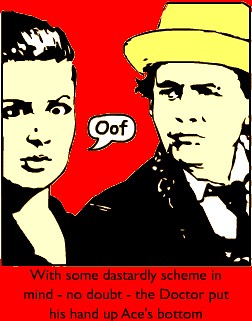Okay, I admit that I read 1599 to swot up for next year’s Droo. Pretty sure that’s why I got bought it, too. Not that I’m sure it will help:
“I cut myself off from reading anything about Shakespeare, went on what I knew already, and then checked afterwards. … I didn’t want to read James Shapiro’s book 1599 … in case I got bogged down.”
Gareth Roberts, interviewed by Rex Duis, “Script Doctors”, Dr Who Magazine 377 (3 January 2007), p. 13.
Well, it’s still a rich and lively book, whatever Gareth says. It avoids the usual failing of literary biography (as I’ve discussed with Wodehouse) – not so comprehensively linking the elements in his stories to influences surrounding him that it’s like Will was less creator than copyist. But Shapiro is also keen to show that Shakespeare’s work is not timeless, and that far all he was a transcendent genius, he was very much of his age.1599 is when Shakespeare hits it big. The year begins with the construction of the famous Globe Theatre, in which he himself had a stake. Shapiro explores the mechanics and economics of that investment, and then the politics and practical necessities that influenced the writing of “Henry V”, “Julius Caesar”, “As You Like It” and “Hamlet”.
As well as some heavy-going analysis of particular snippets of play, it’s full of facts and detail. I discussed the relevance of 17 November back on, er, 17 November. Neat.
In exploring the adventures of the Earl of Essex and his ill-fated trip to Ireland, there’s something broader to be said about the fickleness of heroism. Essex’s collapse from grace is just as wild, explosive and tragic as the stuff what’s in Shakespeare’s writing.
We also get a sense of the wide, heady mix of high and low cultures which Shakespeare had to straddle. His works were performed for the old Queen amid the sumptuous decorations of Whitehall. Yet they also needed to win an audience from the bear baiting and cock fights crowding the rascally South Bank.
It’s little wonder then that his peers were taking risks, writing stuff that would get them fined or even land them in prison. Our Will seems to have deftly dodged anything too controversial, while retaining a verve and topicality that appealed to all classes of folk. (Shapiro’s also good on how plays would be taken off when events made them a little too topical…)
There’s also some fun detail about everyday practicalities – that bookshops would have very individual stock, and that without any copyright a book of Shakespeare’s poetry wasn’t necessarily all by him.
I was also enraptured by the consequences that follow from news being so slow to travel. There’s some mystery about how many weeks elapsed before Will heard of the death of his son. More fun is the courtly entanglements as London is unable to prove one way or another if England has just been invaded.
All in all, it’s a vivid animation of late-Tudor London, rich, sweaty and teeming with life. Especially so, as I read it in Florence, which I said had the same kind waterfront of crowded, timber dwellings seen in the cockney models of “A Knight’s Tale” and Olivier’s “Henry V”.
Two more top facts: 1599 was also the year that Oliver Cromwell was born. And I’m strangely pleased by the word crucifige (“Crucify him”), given on p. 208.








